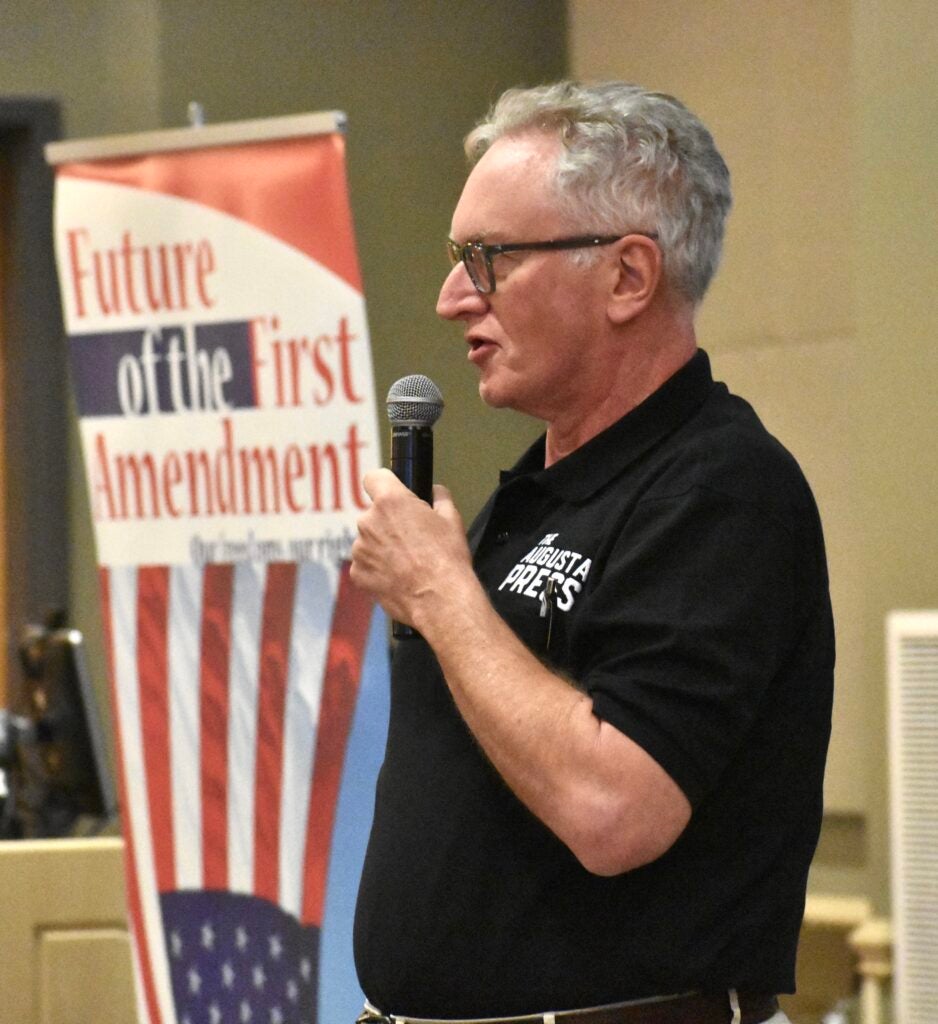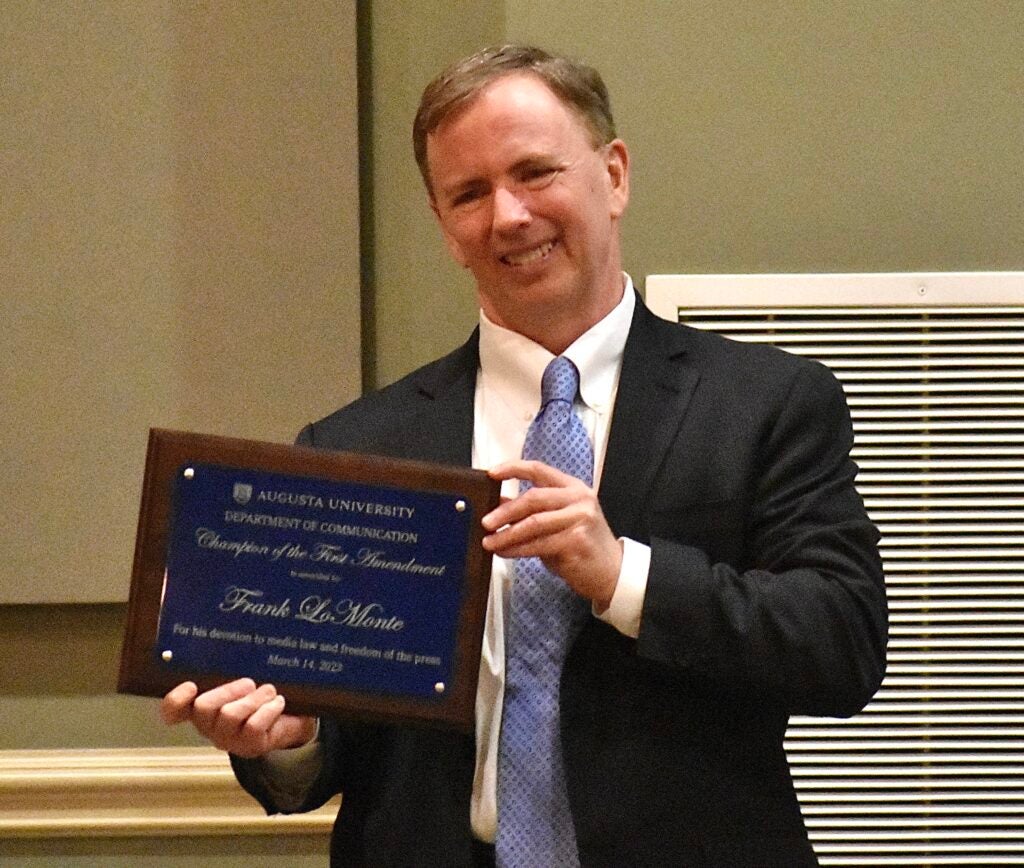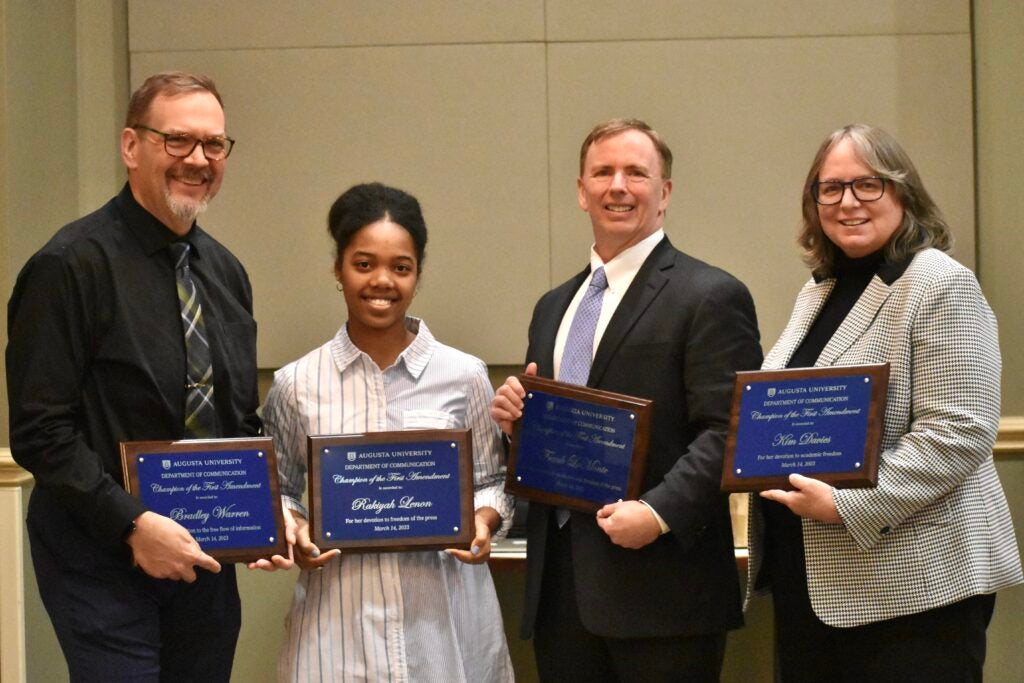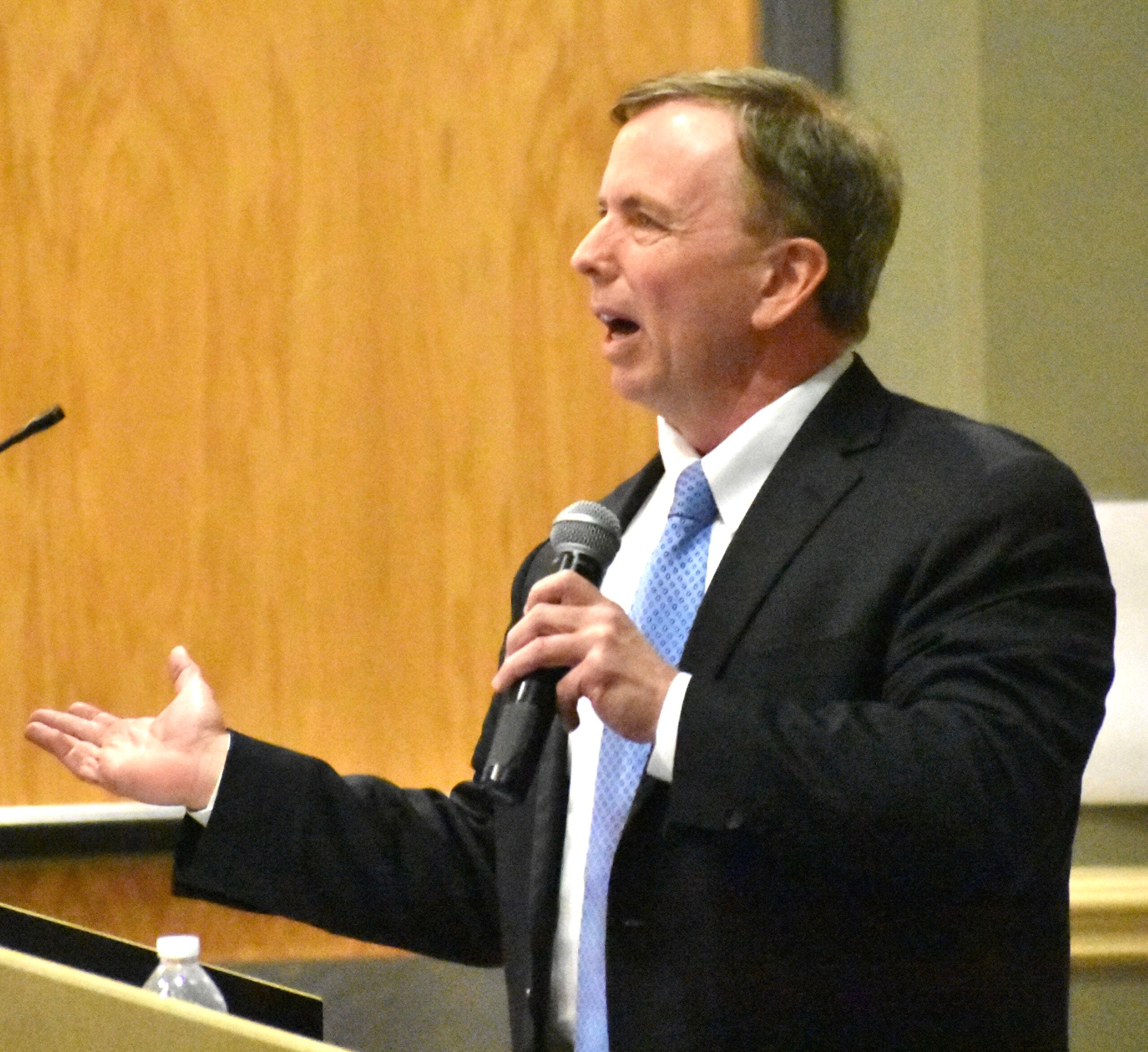College students, professors, children and older adults filled the room Tuesday evening to hear from Frank LoMonte about the First Amendment at Augusta University on March 14.
LoMonte, who is a veteran legal counsel and an attorney for CNN, focused his lecture on free speech and transparency on college campuses, as well as lessons he learned throughout the pandemic.
Through mentions of book bannings, drag show cancellations and viral social media posts, LoMonte demonstrated the different instances in which the First Amendment is being challenged in today’s culture.
“So, when the First Amendment shows up in conversation it is sort of like FEMA showing up,” he said. “On the one hand you’re really happy to see them and I’m really happy the First Amendment is there, but on the other hand you’re almost always in a disaster when it shows up. You’re always waist deep in mud when the First Amendment comes to rescue you.”
LoMonte said the First Amendment is often threatened or challenged only when something problematic or argumentative is being emphasized.
“While it’s terrific we have the protection of freedom of speech, freedom of speech doesn’t matter when you’re not saying something controversial – nobody is trying to silence you for saying ‘happy Mother’s Day’ or ‘have a nice day’ or singing the ‘Star Bangled Banner,’” he said. “They’re trying to silence you when you’re out there on the fringes saying something that pushes people’s boundaries or pushes people’s buttons.”
LoMonte continued by explaining how the First Amendment and its guidelines on prior restraint protects news media to publish any information no matter the methods of retrieval – illegal or otherwise.
“The First Amendment and its protection of Freedom of the Press is really, really, really powerful when it comes to information you already have in your hand,” he said. “Once you have information in your hand as a speaker or a publisher, there is nothing the government can do.”

However, LoMonte also said there are no rights in the Constitution that forces the government to also be openly transparent with the country. There are open record acts, freedom of information acts and open meetings acts, but these can be altered and tampered by legislators.
“Legislators giveth and they can taketh away, and they do,” he said. “This is the reality of the law of access.”
LoMonte gave the example of state legislators creating over 1,100 categories of documents that Florida legislators have decided the public is not privy to view.
But, in regards to protections which do exist, LoMonte highlighted how all levels of government are bound by the same First Amendment laws – including colleges seeming to twist and overreach different ways to limit free speech.
LoMonte stressed how colleges, a place which should be a leading institution for free speech, are often limiting and silencing students through their handbooks, especially important figures such as athletes, resident assistants, staff and even regular students.
“Many of these aren’t just restrictions on speaking, but they go further to say, ‘and if we do give you permission to speak, make sure you don’t ever criticize it. Just say positive things,’” he said. “One of the things we hold dear in our society is whistleblowing … and these are anti-whistleblowing rules that explicitly forbid it inside a field of college sports where, let’s just be honest about it, there’s a fair amount of abuse that goes on.”
According to LoMonte, without prior permission, so many are afraid to speak to the news media today due to fear of retaliation from work or college – from being fired, thrown off the team or scholarships pulled.
“We’re really just now going to appreciate how much exploitation of young people is happening inside the silence of the locker room; the government enforced silence of the locker room,” he said. “It’s just wrong, and why would you want to have that level of control over people?”

Throughout his speech, LoMonte said he believes in advancing the significance of transparency across all colleges, and government facilities to prevent further erosion “of the public’s right to know,” because it is directly linked to the public’s loss of confidence and trust in all institutions.
“The only way to rebuild that is to let it all hang out – for agencies to show us their records, invite us into their meetings, let us see the messages they’re exchanging so that we don’t have to guess,” he said. “Guessing is what leads to suspicion.”
After LoMonte’s speech, awards for protecting free speech were given to LoMonte and other Augusta University personnel to champion their efforts in promoting the First Amendment.
“I really want [college students] to appreciate that they probably have more legally protected rights than they think they do, and that the First Amendment is really powerful and it applies to them in their student life,” he said. “A lot of times they think that their university is all powerful over you, and it controls your future and can do anything to you, but that’s really not true … the law is very much on your side.”
Augusta University’s Pamplin College of Arts, Humanities and Social Sciences Dean Kim Davies said she believed LoMonte’s lecture was important, because college students should be included in the conversation about the current taxation of freedoms.

“No matter where you fall on the political spectrum on any issue, I think we should have the right to talk about things respectively,” she said. “We want to give students the freedom of speech, and I think it helps to listen – that’s the way I’ve always led, by listening to others. Everyone doesn’t always tell me what I want to hear, but I can’t do a good job if I don’t know what’s going on.”
Communication professor, author and experienced journalist Rachel Balducci required all of her intro to professional writing students to attend the lecture, because she hoped they would gain a deeper understanding of their rights.
“[Free speech] is such a healthy part of our society,” she said. “They need to understand where they fit in with our ability to say what we want to say, what’s covered and what’s not. I think one of the things that he covered today that was so important is this idea that the sky is not the limit, which is fascinating for better or for worse. We all need to understand that what we do could have consequences … and it’s important for us to know that before we act, say or do things in a public place.”
Overall, several of the staff and LoMonte voiced their hope that attendees gleaned the importance of the First Amendment and its future in a world of social media, political polarization and each individual’s social responsibility to fight for a more transparent world.












